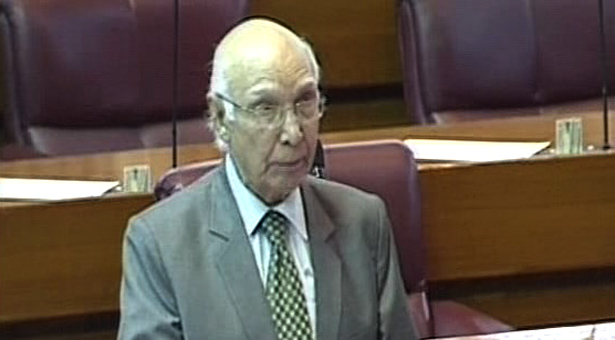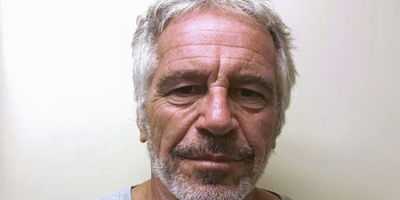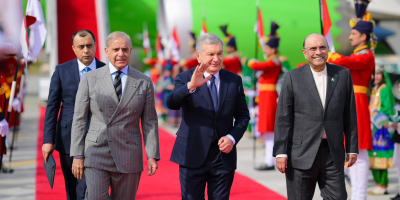Sartaj says no pre-conditions should be attached to talks with Taliban

ISLAMABAD (DNA) – Sartaj Aziz has said no pre conditions should be attached to talks with Taliban. while speaking on the opening of four nations moot in Islamabad on Monday he said, “I would like to extend you a very warm welcome for this important first meeting of the Quadrilateral group being hosted by Pakistan today as part of our collective endeavor to facilitate the resumption of the Afghan reconciliation process and coordinate our efforts to move the process forward in a meaningful manner.At the outset, I want to reaffirm that Pakistan values its brotherly and neighbourly relations with Afghanistan, and is firmly committed to continue serious efforts for long term peace and stability in Afghanistan.
The Fifth Ministerial Conference of the Heart of Asia-Istanbul Process provided positive impetus to our quest for lasting peace in Afghanistan. While the Conference reaffirmed collective regional and international resolve for promoting peace and stability in Afghanistan, the meetings on the sidelines between President Ahraf Ghani and Prime Minister Nawaz Sharif as well as our quadrilateral interaction involving Afghanistan, China, Pakistan and the United States reflected important consensus on the way forward on Afghan peace and reconciliation process.
In this regard, we took two key decisions on the way forward: (a) politically negotiated settlement was the most viable option for durable peace in Afghanistan; and (b) Towards that end, the quadrilateral group should closely coordinate the reconciliation process between Afghan government and Taliban groups.
On 27 December, Chief of Army Staff Gen Raheel Sharif also visited Afghanistan and had useful interaction with the Afghan side for strengthening security and counterterrorism cooperation through intelligence sharing and facilitating the Afghan peace and reconciliation process.
Today’s meeting of the Quadrilateral Group is of great significance. The first and foremost task before the Group is to define the overall direction of the reconciliation process along with the goals and targets it would like to set with a view to creating a conducive environment for holding direct talks between Afghan government and Taliban groups. It is important to undertake a realistic assessment of the opportunities as well as anticipated obstacles in the process and then develop clarity on how to proceed further. In our view, assigning specific tasks amongst us in accordance with the principle of shared responsibility will be crucial for getting the desired outcome.
I am confident your meeting today will be able to evolve an efficient procedural framework to provide the basis for smooth functioning of the Group. In this regard, it is important to underline that the ToRs have to be consistent with the objectives and mandate of the Group.
As you would agree reconciliation through a politically negotiated settlement is an arduous and complex task. In order to ensure that the process remains constructive and achieves a meaningful outcome, following important elements relating to the process and the public messaging have to be kept in mind:
Firstly, the primary objective of the reconciliation process is to create conditions to bring the Taliban groups to the negotiation table and offer them incentives that can persuade them to move away from using violence as tool for pursuing political goals. It is, therefore, important that pre-conditions are not attached to the start of the negotiation process. This in our view will be counterproductive.
Secondly, proper sequencing of actions and measures in the process would be significant in paving the way for direct talks with Taliban groups. Threat of the use of military action against irreconcilables cannot precede the offer of talks to all the groups and their response to such offers. Distinction between reconcileables and irreconcilables and how to deal with the irreconcilables can follow once the avenues for bringing them to the talks have been exhausted.
Thirdly, certain CBMs can play a key role in encouraging Taliban groups to join the negotiation process.
Fourthly, while the roadmap is important for charting the course of action, it has to be realistic and flexible. It should broadly define steps and phases, but avoid unrealistic targets and deadlines.
Finally, while positive public messaging is important, keeping in view the sensitive nature of Group’s work, it should be our endeavor to keep the work of this group out of media glare, as much as possible.
I am confident that the meeting of the Quadrilateral group will have constructive and meaningful deliberations focusing on all relevant issues and charting the way forward keeping sight on our shared goal of achieving lasting peace in Afghanistan through a politically negotiated settlement.
I wish to conclude with my best wishes for your proceedings today.
Related News

US lawmakers accuse Bondi of hiding names of Epstein associates
NEW YORK, FEB 12 /DNA/: A Republican US lawmaker on Wednesday accused Attorney General PamRead More

Uzbek President Mirziyoyev in Islamabad for a two-day state visit
Asnar M Bhatti ISLAMABAD, President of the Republic of Uzbekistan Shavkat Mirziyoyev on Thursday arrivedRead More


Comments are Closed